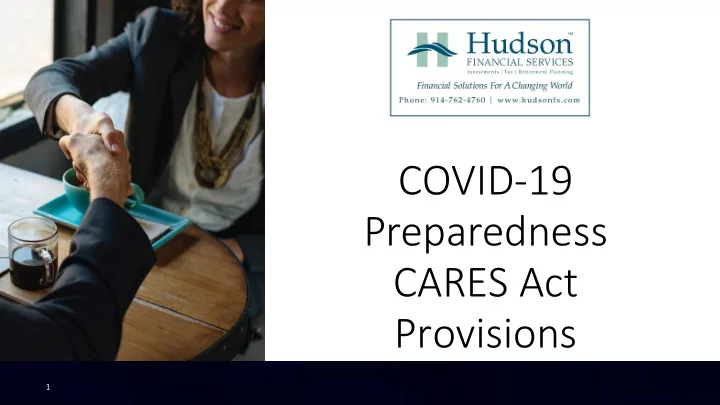

COVID-19 Preparedness CARES Act Provisions 1
Stimulus Checks = Cash Now Maximum of $1,200 per adult and $500 per dependent child under age 17 • Advanced credit determined based on 2019 return if it has been filed • If 2019 return has not been filed, determined based on 2018 return • Credit will be calculated again in 2020, and if amount is higher in 2020 additional credit will be allowed, if the credit is lower on the 2020 return no payback is required • Credit is reduced when income is over the threshold, reduced $5 for every $100 over the threshold • $75,000 for single or separate; $112,500 for head of household; $150,000 for joint Taxpayer must have a SSN to qualify for the credit IRS will send direct deposit if they have that info, otherwise mail checks. Notifications about how they sent the money to come out from the IRS within 2 weeks of sending the money. New website to be created to update banking information with IRS. 2
Retirement Plan changes Coronavirus distributions allowed from qualified plans Requirements: 1. Take a distribution in 2020 2. Be directly impacted by coronavirus meaning they are diagnosed with it, have a spouse or dependent diagnosed, experiencing adverse financial consequences of being quarantined or furloughed or laid off, reduced hours as a result of the public health crisis Benefits: 1. No 10% penalty for early withdrawal 2. Money can be replaced within the 3 years and counted as a rollover so it isn't taxed RMDs are also waived for 2020 year if they haven't been taken yet. Still allowed to take them, just not required. If already taken, and within 60 day window, can re-deposit as “rollover” undoing distribution. 3
Charitable Contributions • $300 above the line tax deduction allowed for charitable contributions • Taxpayer must not itemize (they would receive benefit of charity on Schedule A, so no double benefit) • Contributions must be cash contributions. Donations of stock or clothes and household items do not count. • Contributions to a donor advised fund, even cash donations to a donor advised fund, do not count • Contributions to private foundations do not count • Currently this is only for the 2020 tax year, but the way it was written suggests it may be extended in the future 4
Student Loans • Employer can contribute $5,250 towards student loans for employees as part of the fringe benefit • This is an expansion of the existing tuition benefit where employers can pay $5,250 of tuition reimbursement for employees as a tax free fringe benefit • The CARES Act suspends principal and interest payments, on federal direct and Federal Family Education Loans (FFEL) until September 30 th • Students with the federal loans receive an automatic deferment; the federal student loan servicer will suspend all payments without any action from the borrower. No interest would accrue during this time period. • This benefit also does not apply to private (non-federal) student loans. 5
Recommend
More recommend